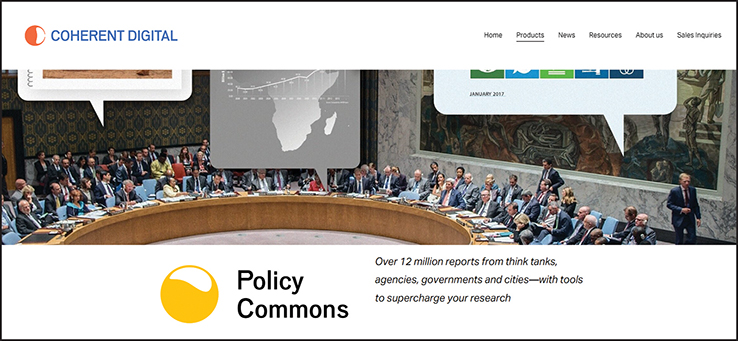Policy Commons | eReviews
The Policy Commons database is a powerful search engine that offers discovery and access to millions of gray literature documents on public policy.
Policy Commons Coherent Digital
CONTENT Policy Commons is a public policy database launched in 2020 by Coherent Digital, a six-year-old startup company from the founders of Alexander Street Press. Policy Commons aggregates and searches across more than 12 million reports from more than 38,000 organizations worldwide. The database contains six modules: Global Think Tanks, North American City Reports, Public Health and Social Care, World Cities, World Governments, and Policy Commons: Oceania.
Policy Commons facilitates discovery of gray literature at scale. It lightly curates and aggregates reports, working papers, newsletters, and other documents produced by think tanks, government agencies, universities, nongovernmental organizations, and the private sector. Subject coverage is wide-ranging, with particular strength in economics and urban studies.The powerful search engine doesn’t let users feel overwhelmed by the vast array of content and the medley of topics.
Policy Commons is valuable because it gathers scattered content and provides stable access to ephemeral online gray literature, even though most documents on Policy Commons are available elsewhere, including many on the open web. Some are licensed exclusively through Coherent Digital, and others are archived from inactive organizations. Policy Commons hosts documents on its servers or redirects users to publicly accessible copies on external websites.
USABILITY Policy Commons offers an uncluttered and visually appealing user interface, making it easy to browse, search, and access content. The platform uses a responsive design, so users can seamlessly navigate and view content even on mobile devices. The top navigation bar lets users browse by publication, organization, or topic and select for documents with data tables or within a specific module. More than 3,000 topic pages with descriptions and pre-populated keyword searches cover topics from abbreviations and Abkhazia to zirconium and zoology. The “lists” feature comprises documents on dozens of topics curated by the Policy Commons editorial team, like “LGBTQ+ in Public Health Policy” and “Putin and Ukraine 2024.” Policy Commons features a powerful search tool. The advanced search supports Boolean logic and proximity searching and automatically returns results for all words with the same root and spelling variants. Researchers can build search strings of up to 10 keywords or phrases and search each term across all data fields or only within the title, summary, full text, or author fields. Users can also filter search results by date range, organization name, organization type, document type, country, language, module, and topic. This granularity is impressive, though metadata is quite basic, often autogenerated, and inconsistent in terms of completeness and accuracy. Users who create personal accounts can build and share custom lists, follow organizations and topics, receive alerts, and upload their own content or links for inclusion in Policy Commons.
PRICING Policy Commons is available for annual subscription based on institutional size. Perpetual rights to licensed content are available for one-time purchase. Institutions can subscribe to the entire database or any of its six modules. For instance, annual subscriptions to Global Think Tanks range from $6,560 for very small libraries to $20,000 for the largest; purchase of the perpetual archive within that module costs between $34,460 and $70,500 and includes a five-year subscription to the rest of the content. The other five modules are smaller and are priced accordingly.
VERDICT Policy Commons offers discovery and access to millions of gray literature documents on public policy. A powerful search engine offsets the mixed-quality metadata. Research organizations with policy, international trade, or public health programs should consider this database.
RELATED
ALREADY A SUBSCRIBER? LOG IN
We are currently offering this content for free. Sign up now to activate your personal profile, where you can save articles for future viewing










Add Comment :-
Comment Policy:
Comment should not be empty !!!